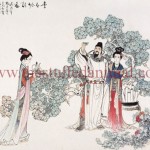Poets emerged in large numbers in the Tang Dynasty, among whom the three most celebrated were Li Bai, Du Fu and Bai Juyi.
Li Bai studied very hard and had an ambition to serve the country in his youth. But he became disillusioned with the orthodox ladder to success through officialdom. He devoted himself to traveling, drinking and writing poems. Many of his poems eulogize China’s scenery. For example, he describes the vastness of the Yangtze as follows: “The lonely sail disappears in the distance, leaving the sky clear and blue/ There remains nothing but the Yangtze flowing to the horizon.” Of the Yellow River he writes, “The waters of the Yellow River come down from Heaven/ Rushing to the sea, never to come back”. He says of the Lushan waterfall: “Its torrent dashes down three thousand feet from high/ As if the Milky Way has fallen from the azure sky.” Another poem of his describes his longing for his hometown in the dead of night: “The bright moonlight before my bed/ I thought was frost on the floor/ When I raised my eyes I saw the moon gleaming/ When I dropped my head, I thought of my hometown. He was spoken of as the “poet immortal” by people of his time.
When he was just a teenager, Bai Juyi wrote famous verses like “The grass on the vast prairie lives and dies every year/ Fire cannot burn it all/ When the spring wind blows/ It will grow again”. His poems are easy to understand, and were popular in his lifetime. It is said that after he wrote a poem he first read it to an old woman. He would amend it until the old woman could understand it. Of his profuse works, the most famous are the long narrative poems The Everlasting Regret and Song of a Papa (Lute Player)












发布产品咨询